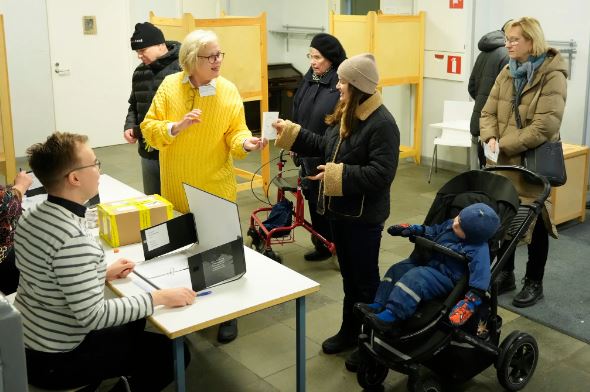Finland’s presidential election has advanced to a runoff as no candidate secured a majority in Sunday’s closely watched vote, occurring against the backdrop of heightened tensions with Russia, NATO’s newest member.
Alexander Stubb and Pekka Haavisto emerged as the top two contenders in Sunday’s election, with both candidates possessing strong foreign policy credentials. With 99.9 percent of the votes tallied, Stubb secured 27.2 percent while Haavisto garnered 25.8 percent, setting the stage for a runoff scheduled for Feb. 11.
The forthcoming victor will assume the presidency from the highly popular incumbent, Sauli Niinistö, who has served two terms and is ineligible for re-election. Niinistö, credited with steering Finland into the NATO alliance, leaves behind a legacy of diplomatic prowess and national stability, leaving the incoming president with significant responsibilities.
While most European presidencies are largely ceremonial, Finland’s president plays a pivotal role in shaping foreign policy and serves as the commander in chief, particularly crucial amid concerns of Russian aggression in the Baltic Sea region. Niinistö’s leadership during Russia’s invasion of Ukraine in 2022 elevated his global stature, underscoring the weight of the role his successor must carry.
The next president faces the challenge of managing Finland’s integration into NATO and navigating regional security dynamics, given Finland’s historically complex relationship with its eastern neighbor. With an 830-mile border shared with Russia and a history marked by conflict, Finnish voters prioritize security and seek a leader with robust foreign policy experience.
Both Haavisto and Stubb boast extensive backgrounds in foreign affairs, with Haavisto making his third presidential bid after serving as Finland’s foreign minister from 2019 to 2023. Stubb, a former prime minister and foreign minister, re-entered politics driven by concerns over Russia’s actions in Ukraine.
Despite their shared stance on key foreign policy issues, including NATO membership and managing relations with Moscow, their personalities and campaign strategies have differentiated them. Stubb’s athletic pursuits and public appearances contrast with Haavisto’s engagement with younger voters through DJ performances.
Beyond foreign policy, the president is expected to provide leadership on domestic issues, including economic challenges, aging demographics, and labor market dynamics. While the prime minister primarily handles domestic affairs, the president’s role in upholding national values and unity remains crucial.
As the election heads to a runoff, both candidates emphasize the importance of values and leadership. Stubb acknowledges the similarity in their views but underscores the need for a leader suited to a new era. Meanwhile, Haavisto emphasizes the importance of steady leadership and contrasts their approaches to governance.
With Finland’s tradition of high voter turnout, Sunday’s election saw nearly 75 percent of eligible voters casting their ballots, reflecting the electorate’s engagement and the significance of the presidential race.
As the runoff approaches, Finland awaits the outcome that will shape its foreign relations and domestic trajectory, with the new president inheriting the responsibility of navigating Finland’s role in a complex geopolitical landscape.
